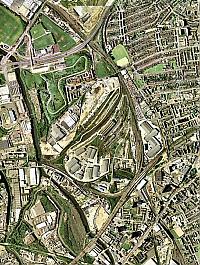Trends affecting Property Investment Potential
I would like to share some insights into trends that help drive house price fluctuations and rental demand. There are very many variables, but the key thing to remember is 'supply and demand'.
 Trends that lead to increasing demand and trends leading to reducing supply, and the combination of these together – will drive property prices up. The converse is also true. House price markets can be incredibly localised – even within a street, or small part of a town. The same is true for rental properties – the less rentals coming onto the market and the more renters looking for property in the area will drive property prices up, and vice versa.
Trends that lead to increasing demand and trends leading to reducing supply, and the combination of these together – will drive property prices up. The converse is also true. House price markets can be incredibly localised – even within a street, or small part of a town. The same is true for rental properties – the less rentals coming onto the market and the more renters looking for property in the area will drive property prices up, and vice versa.
I will provide a number of specific examples of areas in the UK where I currently believe rental property investment is good. But rather than the specific areas being important, it’s more the concept of why an area is good versus not which is key.
 These concepts can be applied to any area in the world because they are essentially based on supply and demand. Where demand outstrips supply, house prices go up, and where demand does not outstrip supply, house prices go down. Simple. So the key is to see which factors and trends will lead to demand going up and supply coming down for a specific property type in a particular area.
These concepts can be applied to any area in the world because they are essentially based on supply and demand. Where demand outstrips supply, house prices go up, and where demand does not outstrip supply, house prices go down. Simple. So the key is to see which factors and trends will lead to demand going up and supply coming down for a specific property type in a particular area.
So when I say later that “Folkestone” is a good property investment area – it is not for all properties. Only selected types. For example, in New Cross SE London at the moment, the capital value of one bedroomed flats has not increased for about 12 months – actually seems to have come down a bit. But these same one bedroomed flats are the only segment of rental accommodation “moving” at the moment. Large (often shared) houses and flats are not moving – why?
Probably because the people previously sharing have found they can now afford to “go it alone” and are renting one bedroomed flats.  Students are also renting one and two bedroom flats – these tenants are getting more choosy, supporting the bottom end of the market whilst the middle end is poor and the top end is non-existent (US/European/UK corporate lets are still in the doldrums after the economic slowdown 2001-mid 2003).
Students are also renting one and two bedroom flats – these tenants are getting more choosy, supporting the bottom end of the market whilst the middle end is poor and the top end is non-existent (US/European/UK corporate lets are still in the doldrums after the economic slowdown 2001-mid 2003).
So the question is, is it worth buying 1 bedroomed flats in New Cross? Well, because the prices have shot up from 50,000 pounds in 1999 to 125,000 pounds in 2002 and have stayed static for the last year, I’m not sure. I think the prices will go up further in the next 10 years because the area is regenerating, is close to the City and Canary Wharf, but I’m not sure in the next year anything particularly positive will happen.
Interesting to note that 1 bedroom flats in Lewisham have risen a lot faster – there is more of a shortage of this type of property in the area. Similar flats have risen from 60,000 pounds in 1999 to 145,000 pounds now and are still rising. This is probably because the area is a bit more gentrified, housing stock is a bit better and the proximity to Canary Wharf (DHL) is still driving prices up.
Positive Change
Now, the key variable that would lead to strongly underpinned capital value increases – and indeed sometimes stellar increases is “positive change”. What is a positive charge? Something that happens in an area that increases demand for property. Examples include:
- Infra-structure : A new railway station reducing commuting time to the City from 40 mins to 20 mins.
- Jobs : A company sets up a new office creating say 2000 jobs in a town of 50,000 population.
- Regeneration : The area has an injection of public and private funds with new facilities and “gentrification” of run-down areas
- Demographics : The population increases, which increases demand
These forces tend to drive prices up – if you get all four together, you will experience stellar rises such as has been seen in Stratford, East London. Prices of 1 bedroom flats in the neighbourhood have gone up from 30,000 pounds in 1997 to 130,000 pounds today and they are still rising. However, past performance is not indication of future performance. If prices have already gone up four-fold in 5 years, you have to be wary of getting your fingers burnt. I still believe Stratford is a good long term bet though I can afford to take more risk than most because I already have a property portfolio – I would be wary of advising a first time buyer to purchase in the area in case the prices come down in the next few years.
Individualism and Independence
 The size of the average household has reduced considerably over the last 30 years because of small families, increasing divorce rates, more women living independently and an ageing population of “empty nesters”. Furthermore, widows are often living on their own for longer, often many years after their spouse departs. There is also a general trend towards independence and individualism. Younger people are leaving home earlier (ref: Hometrack 2003 Review). Often people get married but maintain two properties for financial security, in part to mitigate the risks in case of separation, divorce or other factors such as change of job for dual careers couples. Women are buying more property on their own, particularly those with professional jobs.
The size of the average household has reduced considerably over the last 30 years because of small families, increasing divorce rates, more women living independently and an ageing population of “empty nesters”. Furthermore, widows are often living on their own for longer, often many years after their spouse departs. There is also a general trend towards independence and individualism. Younger people are leaving home earlier (ref: Hometrack 2003 Review). Often people get married but maintain two properties for financial security, in part to mitigate the risks in case of separation, divorce or other factors such as change of job for dual careers couples. Women are buying more property on their own, particularly those with professional jobs.
The “materialism” of the late 20th century has contributed to property often being viewed as a material possession – in a similar way to cars. People’s individualism (rather than collectivism borne out of old institutions) has lead to a greater aspiration for individuals and couples owning their own property – there is likely an element of “security, power and/or prestige” in this psyche. These factors have led to increasing demand for property of all type, exacerbated by an increase in population.
Here are some key trends that I believe will affect UK property investment prices now and in the future:

